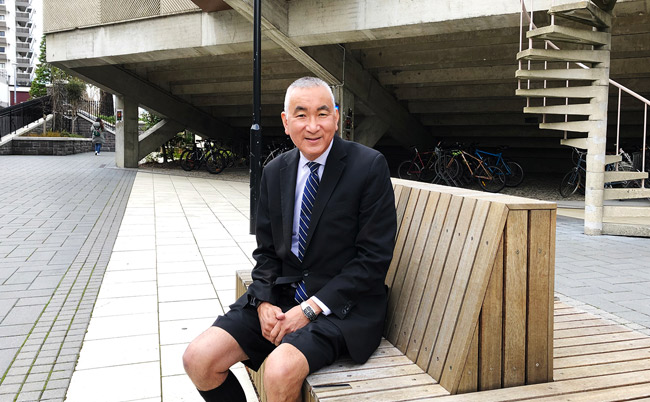Thursday 13 June 2019 10:12pm

Harraways 1867 Visiting Professor Rickey Yada on Otago's Dunedin campus this week.
“Eat food, not too much, mostly plants" is a quote from noted food writer Michael Pollan and is offered by visiting Harraways Professor Rickey Yada to position his upcoming public lectures on the current movement towards plant-based diets.
Professor Yada, a Professor of Food Science at the University of British Columbia, has just arrived at Otago for a month as this year’s Harraways 1867 Visiting Professor.
It is simple messages such as Pollan’s from his book In Defence of Food that help break through the complexity of information and advice which now permeate the contemporary food industry, Professor Yada says.
"Any innovation in the space of sustainable and environmental thinking requires a systems approach crossing a number of perspectives including environmental, technology, human health, consumer and regulatory."
Professor Yada has recently received an honorary Doctor of Science for his global contributions to food science and technology.
During his month at Otago he will attend workshops, the New Zealand Institute of Food Science and Technology conference, and give two public lectures on The shift to plant-based and flexitarian diets: environmental pitfalls and possible solutions.
With the current world focus on sustainability and reducing greenhouse gas emissions, one of Professor Yada’s research interests is on the wide ranging implications of a global shift towards plant-based protein sources.
“Any innovation in the space of sustainable and environmental thinking requires a systems approach crossing a number of perspectives including environmental, technology, human health, consumer and regulatory,” he says.
“There’s so much complexity around the production, consuming and eating of food now, that a multi-disciplinary approach is necessary for researching any related issue.”
The Faculty of Land and Food Systems, of which Professor Yada is the Dean, embraces this integrated approach by encompassing broad disciplines from plant and soil science, to animal welfare.
One of the flagship resources of the University of British Columbia is a 24 hectare farm located on campus on the traditional, ancestral, and unceded territory of the Musqueam people, and is also the only farm within the city of Vancouver.
“The farm is certified organic, which is a fantastic space for fundamental and applied research and learning, as well as a centre for community activities,” Professor Yada describes.
"For some kids, thinking a ‘spaghetti tree’ actually exists may not be too far from reality, so having this farm as a learning tool is really valuable."
While the entire farm is certified organic, approximately half is in secondary forest, just over three hectares is used for commercial fruit and vegetable production, and the remainder for teaching gardens and other learning spaces.
“For some kids, thinking a ‘spaghetti tree’ actually exists may not be too far from reality, so having this farm as a learning tool is really valuable.”
While Professor Yada’s expertise applies globally, he is very familiar with New Zealand’s specific issues as a member on both the Riddet Institute and Ag Research’s science advisory panels.
He says both New Zealand and Canada are strikingly similar in that both countries are heavily reliant on the production and export of agricultural commodities.
“One of the biggest challenges for both our industries is not to sit still, but to continue moving forward with innovative thinking such as in the creation of value added commodities.”
Professor Yada will be giving public lectures in Dunedin on Thursday 20 June and in Auckland on Friday 5 July at Otago House.
